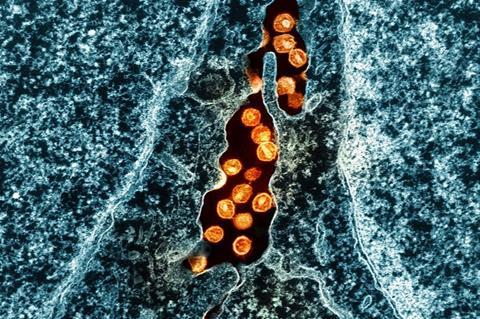Incomplete immune reconstitution is characterized by chronic immune activation and systemic inflammation, which are not fully reversed by antiretroviral therapy. Dihydroartemisinin (DHA) has demonstrated anti-inflammatory and immunosuppressive properties, which may benefit individuals with incomplete immune reconstitution.

This study aimed to investigate the biological mechanisms underlying incomplete immune reconstitution and evaluate the therapeutic potential of DHA in modulating immune activation in immunological non-responders (INRs). The study aimed to investigate the biological mechanisms underlying incomplete immune reconstitution and evaluate the therapeutic potential of DHA in modulating immune activation in immunological non-responders (INRs).
Methods
RNA sequencing data (GSE106792) was retrieved from the Gene Expression Omnibus database. R software and Bioconductor packages were used to identify differentially expressed genes (DEGs) among INRs, immune responders (IRs), and healthy controls (HCs).
Gene Ontology and Kyoto Encyclopedia of Genes and Genomes enrichment analyses, along with protein-protein interaction (PPI) network construction, were performed. Potential DHA-binding proteins were predicted using the STITCH server and molecular docking studies.
Validation experiments were conducted on peripheral blood mononuclear cells from 18 INRs. Cells were treated with varying concentrations of DHA, and CD4+ and CD8+ T cell activation markers (CD38 and HLA-DR) were measured via flow cytometry.
Results
Enrichment and PPI network analysis identified 119, 56, and 189 DEGs in the INR vs. HC, INR vs. IR, and IR vs. HC comparisons, respectively. Enrichment and PPI analyses showed that DEGs were mainly involved in immune response pathways. DHA was predicted to interact with multiple target proteins, indicating anti-inflammatory effects. In vitro, DHA significantly reduced the frequency of CD38− HLA-DR+ CD4+ T cells and CD38+ HLA-DR+ CD8+ T cells at 1,000 µM and 500 µM compared to the control.
This study provides insights into the biological mechanisms underlying incomplete immune reconstitution and supports DHA’s potential as a therapeutic agent. DHA effectively inhibits T cell activation in INRs, presenting a novel and promising treatment strategy.
Topics
- Asia & Oceania
- Beijing Institute of Sexually Transmitted Disease Prevention and Control
- Beijing Key Laboratory of HIV/AIDS Research
- Capital Medical University
- Disease Treatment & Prevention
- Immunology
- Infection Prevention & Control
- Infectious Disease
- One Health
- Peking University
- Research News
- Viruses
- Yang Zhang







No comments yet